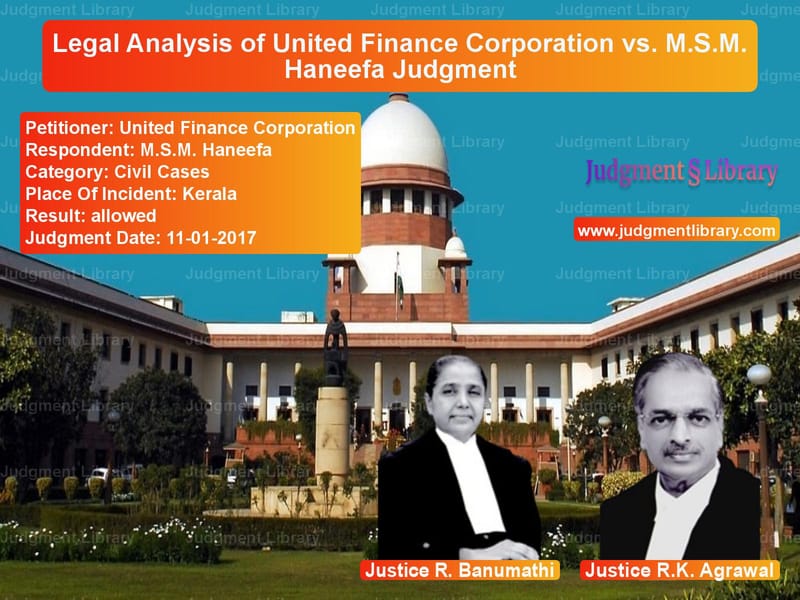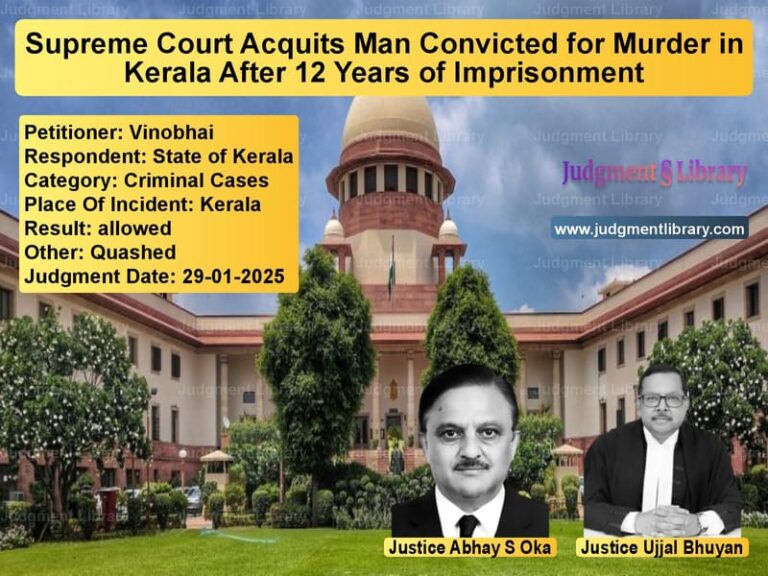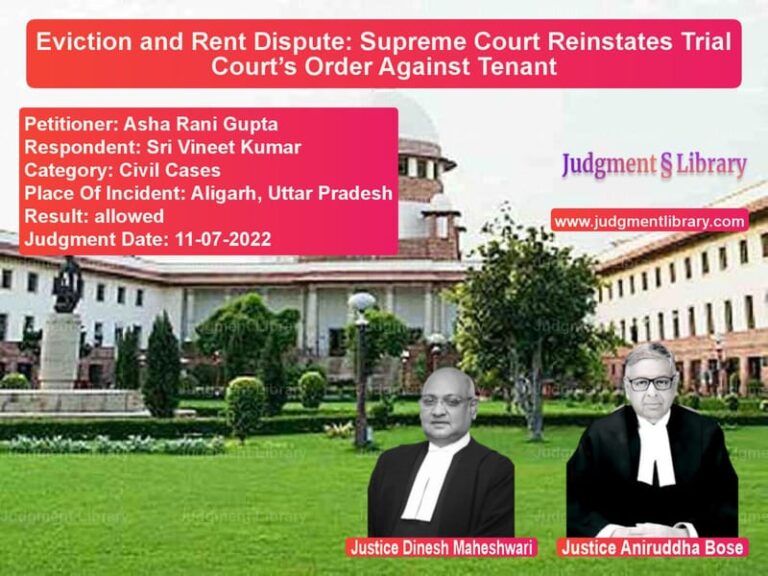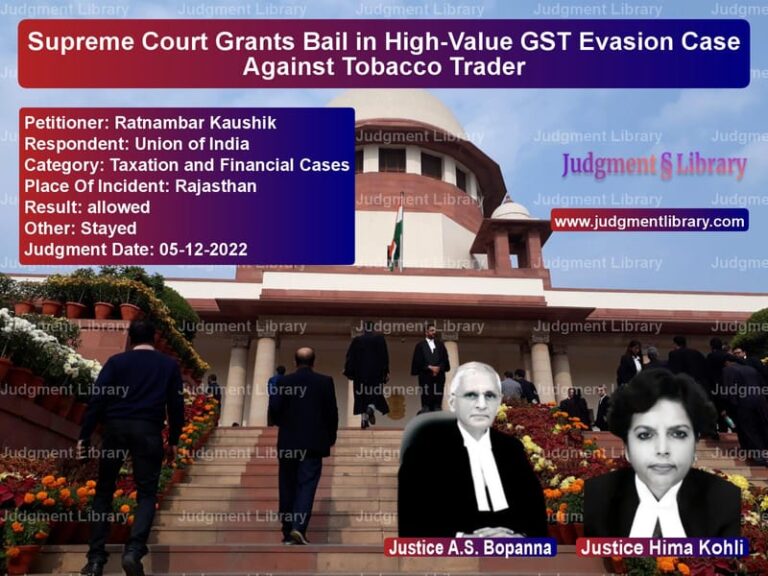Legal Analysis of United Finance Corporation vs. M.S.M. Haneefa Judgment
Introduction
The case of United Finance Corporation vs. M.S.M. Haneefa is a significant ruling on the interpretation of limitation laws concerning possession of property purchased in a court auction. The Supreme Court was called upon to determine whether the appellant’s execution petition for possession was barred by limitation under Order XXI Rule 95 of the Code of Civil Procedure (CPC) and Article 134 of the Limitation Act, 1963. The High Court of Kerala had ruled that the application was time-barred, prompting the appellant to challenge the decision before the Supreme Court.
Background of the Case
The appellant, United Finance Corporation, was the decree-holder in a civil suit against the respondent, M.S.M. Haneefa. A decree for the recovery of Rs.2,72,100 was passed in favor of the appellant, leading to the attachment and subsequent auction sale of the respondent’s immovable property. The property was auctioned on October 27, 2001, and purchased by the appellant itself. The sale was confirmed on June 1, 2002, and a sale certificate was issued on March 17, 2003. However, due to legal proceedings initiated by the respondent to challenge the auction, the delivery of possession was delayed.
Legal Provisions Involved
- Order XXI Rule 95 CPC: This provision enables an auction purchaser to apply for possession of the property once the sale is confirmed.
- Article 134 of the Limitation Act, 1963: It prescribes a one-year limitation period from the date when the sale becomes absolute for filing an application for possession.
- Section 15(1) of the Limitation Act: This section allows for exclusion of time when a legal proceeding prevents execution.
Arguments by the Petitioner (United Finance Corporation)
- The sale confirmation does not make the sale absolute; the limitation period should begin only after the disposal of legal challenges.
- Since the respondent had filed CRP No.2829/2002 challenging the auction sale, the limitation period should be computed from the date of its final dismissal on July 9, 2003.
- Under Section 15(1) of the Limitation Act, the period during which the stay was in effect should be excluded, making the application, filed on August 30, 2003, within time.
Arguments by the Respondent (M.S.M. Haneefa)
- The limitation period under Article 134 of the Limitation Act started from the sale confirmation date, i.e., June 1, 2002, and expired on June 1, 2003, making the application time-barred.
- The issuance of a sale certificate is not necessary for an application under Order XXI Rule 95 CPC, and the appellant should have filed for possession within one year from confirmation.
- Since the appellant was both the decree-holder and auction purchaser, the application for possession was redundant and should not be entertained.
Supreme Court’s Analysis
The Supreme Court examined the provisions of Order XXI Rule 95 CPC and Article 134 of the Limitation Act, focusing on when a sale becomes absolute. The Court made the following key observations:
- A sale does not become absolute merely upon confirmation. If a challenge to the sale is pending, the sale is not final until the legal challenge is dismissed.
- The judgment-debtor’s challenge was dismissed on July 9, 2003, meaning the limitation period began only after that date.
- The execution petition was filed on August 30, 2003, well within the permissible period under Article 134.
- Section 15(1) of the Limitation Act applies, excluding the period of legal proceedings from the limitation computation.
The Supreme Court relied on precedents, including Chandra Mani Saha vs. Anarjan Bibi (1934) and Sri Ranga Nilayan Rama Krishna Rao vs. Kandokori Chellayamma (1953), which held that limitation under Article 134 begins only when the sale is unconditionally confirmed.
Final Judgment
The Supreme Court reversed the High Court’s ruling and allowed the execution petition, concluding:
- The application for possession was filed within the limitation period.
- Since the challenge to the auction was pending, the sale was not absolute before July 9, 2003.
- The appellant was entitled to take possession of the auctioned property.
Conclusion
The Supreme Court’s decision in United Finance Corporation vs. M.S.M. Haneefa establishes important legal principles regarding limitation in execution proceedings. It clarifies that an auction sale does not attain finality merely upon confirmation but only after the disposal of legal challenges.
Key Takeaways
- The limitation period for filing an execution petition for possession begins when the sale becomes absolute.
- If proceedings challenging the auction sale are pending, the limitation period extends until their final resolution.
- The period of stay due to legal proceedings should be excluded while computing the limitation period under Section 15(1) of the Limitation Act.
- The decision reaffirms that execution petitions should not be dismissed on technical grounds of limitation when substantial justice is at stake.
Don’t miss out on the full details! Download the complete judgment in PDF format below and gain valuable insights instantly!
Download Judgment: United Finance Corpo vs M.S.M. Haneefa Supreme Court of India Judgment Dated 11-01-2017.pdf
Direct Downlaod Judgment: Direct downlaod this Judgment
See all petitions in Contract Disputes
See all petitions in Property Disputes
See all petitions in Debt Recovery
See all petitions in Judgment by R. Banumathi
See all petitions in Judgment by R K Agrawal
See all petitions in allowed
See all petitions in supreme court of India judgments January 2017
See all petitions in 2017 judgments
See all posts in Civil Cases Category
See all allowed petitions in Civil Cases Category
See all Dismissed petitions in Civil Cases Category
See all partially allowed petitions in Civil Cases Category







